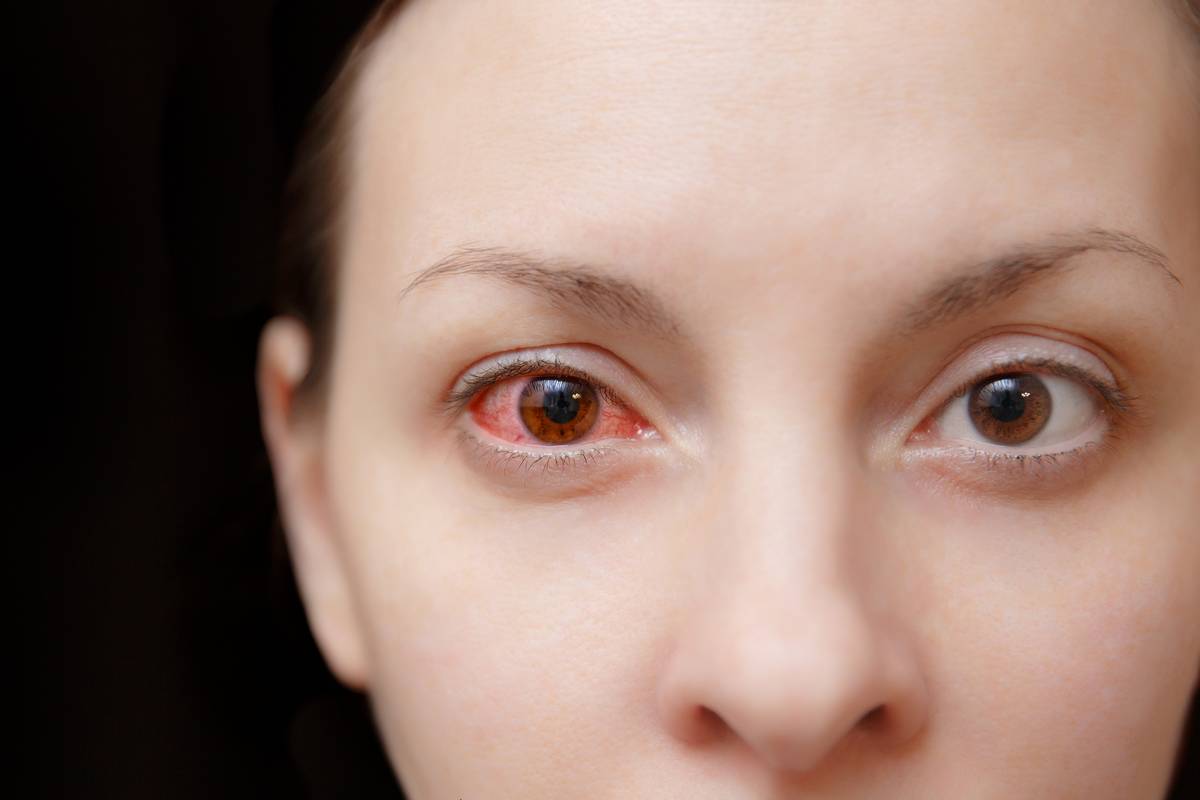Know the Risks: How Dangerous Is Sleeping With Contacts?

Why is sleeping with contacts such a bad idea? Well, because it increases your risk of developing an eye infection by 6 to 8 times.
Most eye infections are avoidable. That’s why it’s so important to follow your doctor’s guidelines for eye and contact lens care. Since contact lenses are medical devices, they need proper care. That way, you’ll reduce any medical risks.
Do you want to know the three risky contact lens behaviours that lead to eye infections? The first is improper use of lens cleaning solution. The second is failure to replace contacts on time. And the third? You guessed it — sleeping with your contacts in!
Here’s what can go wrong if you don’t take your lenses out before going to bed or catching a nap on the sofa.
How Eye Infections Happen
Your eyes need to breathe. During the day, they draw in oxygen from the air. At night, there’s less oxygen coming in. This is because your eyes are shut. So sleeping in your contacts blocks your eyes from getting the air they need.
If your eyes become starved of oxygen, you can suffer from corneal hypoxia. To make up for the lack of oxygen, your cornea grows blood vessels. These blood vessels then block your vision.
Contact lens manufacturers are aware of this issue. Much of their R&D focuses on designing lenses that give your eyes more oxygen. An example is Dailies Total 1 lenses. These are six times more breathable than other leading brands of daily disposables.
Another is Proclear 1 Day lenses. Their hydrogel material attracts water. In fact, they stay 96% hydrated for up to 12 hours of wear time! Eye doctors recommend these brands for those who experience dryness when wearing contacts.
Poor lens hygiene makes matters worse. Failing to clean your contacts case or reusing lens solution are two ways bacteria can grow. If your contacts are not properly disinfected between wears, you’re at risk. Bacteria can easily find its way into the eyes, where it can flourish and trigger a serious infection.
The Worst Infections Caused by Sleeping With Contacts

Keratitis
The most common infection related to wearing contact lenses is keratitis. It is caused by bacteria, viruses, fungi or parasites. Here are some of the common causes of each type:
- Bacterial: Pseudomonas aeruginosa and Staphylococcus aureus on improperly cleaned or handled contact lenses
- Viral: Herpes simplex virus
- Fungal: Aspergillus, Candida or Fusarium
- Parasitic: Acanthamoeba
The symptoms for all types include eye redness, pain, excess of tears and blurred vision.
Depending on the type of keratitis, different types of treatment are used. Respectively, doctors prescribe antibiotics, biocides, antifungals and antivirals. If the infection goes untreated or doesn’t respond to medication, it becomes severe. A serious infection can scar the cornea. If that happens, you will need a corneal transplant to save your vision.
Acanthamoeba Keratitis
Acanthamoeba keratitis is even rarer than bacterial infections or viral keratitis. This parasite can be devastating. It is caused by a water-based amoeba.
Wearing contacts to swim or shower puts you at risk of this disease. In fact, any contact with water that’s not lens solution or sterile saline water is risky.
It is possible to recover from this disease with the right treatment. But many people lose their vision when treatment is delayed.
Pseudomonas Aeruginosa
Pseudomonas aeruginosa is a bacterial infection. Mild infections can occur after coming into contact with water. You can also get it if you use contaminated contacts overnight. Those with weakened immune systems or blood infections are more vulnerable.
This infection can clear up with antibiotic eye drops. But if ulcers develop, they can result in scarring. This, in turn, can cause permanent vision loss. Research shows that 1 out of 5 cases result in scarring and blindness. These severe infections have also led to sight-saving corneal transplants. Many of these cases were linked to sleeping with contact lenses in.
Is It Safe to Sleep With Contact Lenses Approved for Overnight Wear?
Certain lenses, like Optix Air Day and Night Lenses, are Health Canada approved for 30 nights of continuous wear. These lenses give your eyes more oxygen than regular contacts. Optix Air Day and Night claims to be the most recommended brand of overnight lenses.
There are also orthokeratology (ortho-k) lenses. These lenses reshape your corneas overnight. You remove the lenses each morning and have clear vision during the day. This kind of lens is generally marketed toward children with mild myopia. But young adults can use them as well.
However, ophthalmologists and cornea specialists have raised concerns about these lenses. There is always a risk of eye infection when you wear lenses overnight. Some feel that the risks outweigh the benefits.
Daily Disposables Are the Safest Choice

Many optometrists now recommend soft contact lenses as a first choice. Although Health Canada has approved overnight lenses, that doesn’t mean you can keep your contacts in forever! Doctors recommend removing these lenses every few days. This is so you can clean them and give your eyes a break as well. It’s always a good idea to keep wear schedules short.
On the other hand, daily disposable contacts provide excellent visual performance, too. Because they last for only one day, you have a lower risk of irritation and inflammation.
You will likely also enjoy fewer complications or emergency medical visits for your eyes. Improper cleaning and storage of contacts are common causes of many eye infections. When used correctly, daily disposable lenses eliminate that risk.
Make Sure You Never Sleep With Contacts!
Now you know the risks of sleeping with contacts. What next? Well, there’s plenty of great information about taking care of your eyes and contacts on our blog. You can also browse a wide selection of contact lenses. This will help you find the contacts best suited for your eyes.
Our advice still stands. Never, ever sleep in your contact lenses! Keep your eyes healthy by taking the extra time to remove your lenses every night. That way, you'll avoid any infections or other problems with your eyes in the future.
